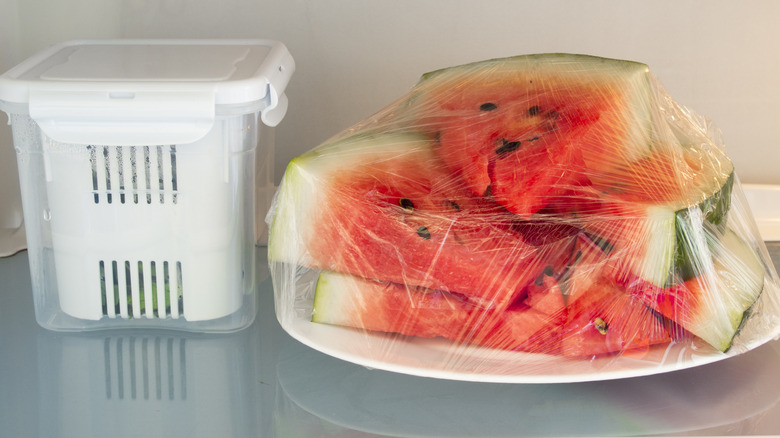The Absolute Best Way To Keep Cut Watermelon Fresh
Can't finish a whole watermelon? No problem! Cut watermelon lasts anywhere from four to seven days when stored properly, and keeping it at peak freshness is easier than you think. Simply refrigerate it as soon as possible while limiting any air exposure.
Maintaining optimum freshness starts by picking the perfect watermelon at the store. Look for any imperfections, like cuts or holes, that would allow air — and subsequently bacteria — into the fruit. Once you've brought your watermelon home and sliced it, cover and refrigerate unused portions immediately. Not sure how much you'd like to eat? You can always store it after snacking, but the sooner the better. Oxygen speeds up the breakdown of fruit, as does keeping the exposed flesh at room temperature.
The way you cover your watermelon before storing depends on how it's cut. Larger slices like wedges or sticks can be tightly covered in plastic wrap, while smaller cubes and bite-size pieces work best in airtight containers. Whether wrapping or using a container, the goal is to limit air exposure as much as possible. Cut watermelon can be safely stored between 9 and 36 degrees Fahrenheit. However, while you can safely freeze watermelon, it turns the flesh mushy and alters the flavor, which is why we recommend refrigerating instead. The fridge's temperature range preserves both taste and texture better than freezing does.
Which part of the fridge is best for keeping cut watermelon fresh?
While wrapped watermelon can go anywhere in your refrigerator, strategic placement maximizes freshness. Since we want to keep cut watermelon between 9 and 36 degrees Fahrenheit, colder sections work best.
The back and bottom shelves are ideal since cold air sinks, and these areas tend to be furthest from the door's temperature fluctuations. The door is the warmest area of the fridge and should be avoided, because even a few degrees can impact how long your watermelon stays crisp and flavorful.
Temperature isn't the only thing that makes location important — your watermelon's neighbors affect its longevity, too! Although watermelons don't produce significant amounts of ethylene, they're sensitive to this gaseous plant hormone, which forces them to spoil faster. Ethylene is the reason some plants ripen after being picked, and ethylene-containing produce includes most tree fruits, along with avocados, cantaloupes, nectarines, and peaches. Fully ripe tomatoes, bananas, and peppers also produce ethylene. Even with tight wrapping, a small tear in the plastic can expose watermelon to these gases, shortening its storage life. Choose a spot in your fridge's coolest zone away from ethylene-producing fruit, and you'll be rewarded with the freshest presliced watermelon possible.

